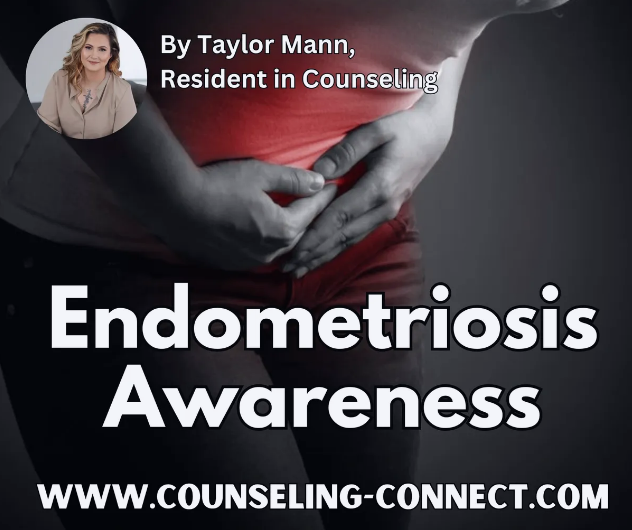By Taylor Mann, Resident in Counseling
March is Endometriosis Awareness Month, a time to shed light on a condition that affects millions of women worldwide. Endometriosis is a chronic and often debilitating condition, where tissue similar to the lining of the uterus grows outside of the uterus, causing severe pain, infertility, and a host of other symptoms. While the physical toll of endometriosis is well-documented, its impact on mental health is equally significant yet often overlooked.
Living with endometriosis can be an emotional roller coaster. The constant pain and discomfort, coupled with the frustration of being misunderstood by others, can take a heavy toll on one’s mental well-being. It’s even more frustrating when the disorder is not properly diagnosed. Many women with endometriosis report feelings of anxiety, depression, and isolation as they struggle to manage their symptoms and navigate the complexities of their condition.
Certain healthcare providers may attribute psychiatric symptoms experienced by patients to the chronic pain associated with endometriosis. While chronic pain can indeed lead to depression, findings from the Yale study suggest that psychiatric disorders are still prevalent among individuals with endometriosis, even after accounting for chronic pain (Backman, 2023). This indicates that there are underlying mechanisms beyond chronic pain that contribute to the decline in mental well-being among these individuals.
Research indicates that a significant percentage of women with endometriosis experience moderate to severe anxiety symptoms and depression, with rates at 29% and 14.5%, respectively. Furthermore, additional studies have highlighted the correlation between endometriosis and a poor quality of life. These findings underscore the multifaceted nature of endometriosis and its impact on mental health, extending beyond the realm of physical pain.
Moreover, the impact of endometriosis on mental health is compounded by the socioeconomic factors that disproportionately affect women, such as limited access to healthcare, financial constraints, and societal expectations regarding gender roles and reproductive health. For many women, the emotional burden of endometriosis is further exacerbated by the fear of infertility and the pressure to conform to traditional notions of femininity and motherhood.
A hundred years ago, the expectation of motherhood was nearly universal. However, in today’s society, there’s a growing number of women who choose to be child-free because they believe it’s not ideal to have children. On the other hand, it’s estimated that about 1 in 4 women are childless, meaning that they want a child, but are unable to have one (Stone, 2022). It’s absolutely possible to live a full life with or without children, but endometriosis may complicate this choice for many.
Furthermore, we must challenge the stigma and silence surrounding menstruation and women’s reproductive health, fostering open and honest conversations that validate women’s experiences and empower them to advocate for their own health and well-being. By de-stigmatizing endometriosis and elevating the voices of those affected by it, we can create a more compassionate and inclusive society where women feel seen, heard, and supported.
As we observe Endometriosis Awareness Month, we want to raise awareness about the physical symptoms of the condition and its profound impact on mental health. By acknowledging the interconnectedness of the mind and body, we can work towards a future where all women can live free from the pain and stigma of endometriosis.
Sources
https://www.cbsnews.com/miami/news/growing-number-of-millennial-gen-z-women-are-childless-by-choice
https://ifstudies.org/blog/1-in-4-projecting-childlessness-among-todays-young-women
#EndometriosisAwareness #NotJustPeriods #PeriodProblems #ChronicPain #WomensHealth

